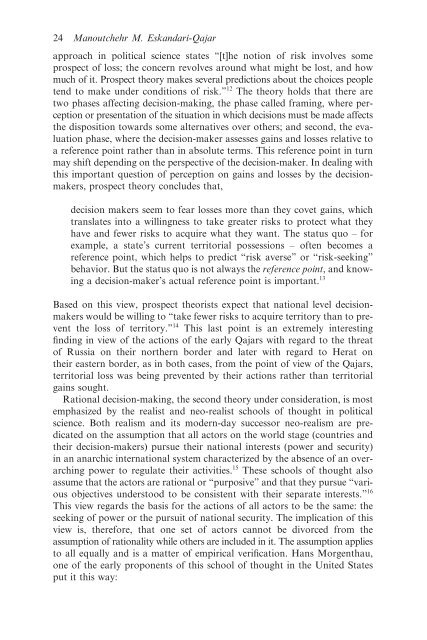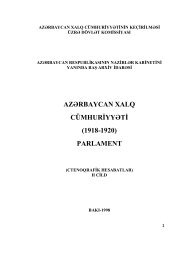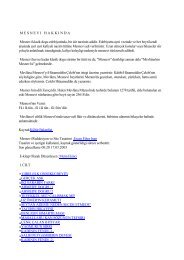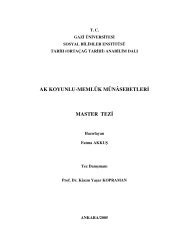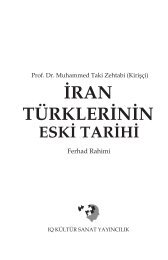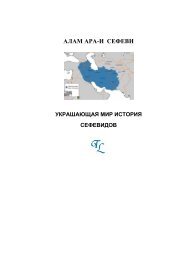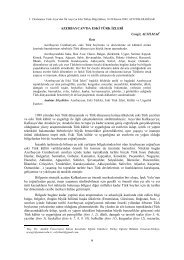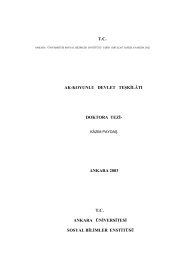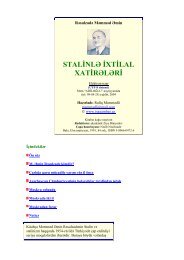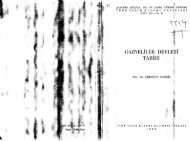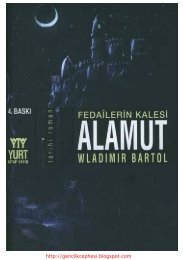War and Peace in Qajar Persia: Implications Past and ... - Oguzlar.az
War and Peace in Qajar Persia: Implications Past and ... - Oguzlar.az
War and Peace in Qajar Persia: Implications Past and ... - Oguzlar.az
- No tags were found...
You also want an ePaper? Increase the reach of your titles
YUMPU automatically turns print PDFs into web optimized ePapers that Google loves.
24 Manoutchehr M. Esk<strong>and</strong>ari-<strong>Qajar</strong>approach <strong>in</strong> political science states “[t]he notion of risk <strong>in</strong>volves someprospect of loss; the concern revolves around what might be lost, <strong>and</strong> howmuch of it. Prospect theory makes several predictions about the choices peopletend to make under conditions of risk.” 12 The theory holds that there aretwo phases affect<strong>in</strong>g decision-mak<strong>in</strong>g, the phase called fram<strong>in</strong>g, where perceptionor presentation of the situation <strong>in</strong> which decisions must be made affectsthe disposition towards some alternatives over others; <strong>and</strong> second, the evaluationphase, where the decision-maker assesses ga<strong>in</strong>s <strong>and</strong> losses relative toa reference po<strong>in</strong>t rather than <strong>in</strong> absolute terms. This reference po<strong>in</strong>t <strong>in</strong> turnmay shift depend<strong>in</strong>g on the perspective of the decision-maker. In deal<strong>in</strong>g withthis important question of perception on ga<strong>in</strong>s <strong>and</strong> losses by the decisionmakers,prospect theory concludes that,decision makers seem to fear losses more than they covet ga<strong>in</strong>s, whichtranslates <strong>in</strong>to a will<strong>in</strong>gness to take greater risks to protect what theyhave <strong>and</strong> fewer risks to acquire what they want. The status quo – forexample, a state’s current territorial possessions – often becomes areference po<strong>in</strong>t, which helps to predict “risk averse” or “risk-seek<strong>in</strong>g”behavior. But the status quo is not always the reference po<strong>in</strong>t, <strong>and</strong> know<strong>in</strong>ga decision-maker’s actual reference po<strong>in</strong>t is important. 13Based on this view, prospect theorists expect that national level decisionmakerswould be will<strong>in</strong>g to “take fewer risks to acquire territory than to preventthe loss of territory.” 14 This last po<strong>in</strong>t is an extremely <strong>in</strong>terest<strong>in</strong>gf<strong>in</strong>d<strong>in</strong>g <strong>in</strong> view of the actions of the early <strong>Qajar</strong>s with regard to the threatof Russia on their northern border <strong>and</strong> later with regard to Herat ontheir eastern border, as <strong>in</strong> both cases, from the po<strong>in</strong>t of view of the <strong>Qajar</strong>s,territorial loss was be<strong>in</strong>g prevented by their actions rather than territorialga<strong>in</strong>s sought.Rational decision-mak<strong>in</strong>g, the second theory under consideration, is mostemphasized by the realist <strong>and</strong> neo-realist schools of thought <strong>in</strong> politicalscience. Both realism <strong>and</strong> its modern-day successor neo-realism are predicatedon the assumption that all actors on the world stage (countries <strong>and</strong>their decision-makers) pursue their national <strong>in</strong>terests (power <strong>and</strong> security)<strong>in</strong> an anarchic <strong>in</strong>ternational system characterized by the absence of an overarch<strong>in</strong>gpower to regulate their activities. 15 These schools of thought alsoassume that the actors are rational or “purposive” <strong>and</strong> that they pursue “variousobjectives understood to be consistent with their separate <strong>in</strong>terests.” 16This view regards the basis for the actions of all actors to be the same: theseek<strong>in</strong>g of power or the pursuit of national security. The implication of thisview is, therefore, that one set of actors cannot be divorced from theassumption of rationality while others are <strong>in</strong>cluded <strong>in</strong> it. The assumption appliesto all equally <strong>and</strong> is a matter of empirical verification. Hans Morgenthau,one of the early proponents of this school of thought <strong>in</strong> the United Statesput it this way:


